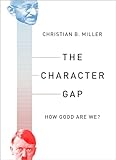The past quarter century of research into human psychology and behavior has revealed that, in many ways, we are strangers to ourselves. We are ignorant of the forces that play a major role shaping our decisions. Choices we assumed were products of free will are, upon closer observation, largely determined by biological, environmental, and social forces outside of our control or awareness.
In many cases, this research has overthrown common assumptions about human nature. For example, according to a 1997 study by social psychologist Robert Baron, the smell of Cinnabon and Mrs. Fields cookies in a shopping mall doubles the likelihood that we would help someone in need. We might prefer to think of ourselves as compassionate people, when in fact we were summoned to action by carbs and sugar!
Such findings can be frightening, in that they force us to rethink the idea of sin and human responsibility, even the nature of our personality. We are far more influenced by our environment, and much else besides, than we would ever wish to admit. One neuroscientist, David Eagleman, even proposes upending our legal system: We should no longer consider people responsible for crimes they commit, now that we know how deeply our environments influence our behavior.
Surprising and enlightening as much of this research is, very often it merely confirms what we ought to know already, either by intuition or by paying attention to Scripture. For example, a study by Cornell psychologist Dennis Regan found that after being made to feel guilty, people are nearly four times as likely to offer help to someone with a problem. But preachers and parents have been known for millennia the power of guilt to spur action.
So perhaps the real benefit from all these recent findings is not a deeper understanding of human nature, but a vindication of what ancient wisdom taught all along. We are both deeply flawed and imbued with the divine. We sink to evil depths, yet arise to glorious heights.
Our Self-Assessment Gap
That’s roughly the conclusion drawn by Wake Forest philosopher Christian B. Miller, whose book, The Character Gap: How Good Are We?, is among the latest reports from the field of behavioral science. Miller is the director of The Character Project, funded by the John Templeton Foundation, which has supported Miller’s work and, through The Character Project, a few of the studies he cites in the book.
Miller sets the stage by clarifying what we mean when talking about character. We live in a society that may have very different values, but overall, Miller writes, we generally agree that character is composed of virtues (like honesty and compassion) and vices (like greed, cheating, or violence). We also tend to agree that motives matter when assessing someone’s character. Doing good deeds in order to be seen doing them doesn’t really qualify as virtuous behavior, however much the intended recipients might benefit.
Oddly, however, Miller concludes this portion of the book with an equivocation. When he encourages his toddler toward good behavior and the child asks, “Why?” Miller admits, “I still need to think of what to say to him.” This uncertainty ends up plaguing the book, leaving the reader as starved for helpful guidance as the author’s young son.
Miller next dives into research about human behavior, arguing that we are not nearly as virtuous as we think—and yet we’re not so bad either. Researchers tagged 20 people in a shopping mall and sent an actor to walk near them carrying a bag leaking candy. It turns out only three people, 15 percent, offered to help. The other 85 percent did nothing. That dismal record improved, however, when the shoppers were made to feel guilty before encountering the woman with the leaking bag.
Experiment after experiment shows that we generally lack compassion, unless we’ve been prodded to be helpful—or given a reason to feel ashamed. With the right incentives, we can indeed be pretty helpful. For example, being asked to imagine living in someone else’s shoes can make us twice as likely to offer assistance to someone in need. Still, Miller concludes, “there might be a fortunate few who have a virtuous character in this area of their lives. Most of us, on the other hand, have a long way to go to become compassionate.”
Not only do we often fail to help others. We can also be incredibly cruel. When simply asked to say unkind things, we will do so. When asked to give lethal doses of electric shocks, the vast majority will comply. “Psychologists have become very good at trigging aggressive behavior in the lab,” Miller writes, citing study after study proving that under the right circumstances most of us willingly go along with incredible evil. Apparently, it doesn’t take much.
So, we are evil? Well, not so fast. If we aren’t provoked, most of us would not take the opportunity to harm someone else, even when certain we would get away with it. While cheating is rampant on college campuses, many of us won’t take opportunities to cheat when assured we won’t get caught. We constantly tell “white lies” in order to smooth social interactions, and we routinely tell big lies in our closest relationships—to avoid shame or stay in a marriage when we have cheated on a spouse. At the same time, many lies are good-hearted, like giving someone an undeserved compliment, for example.
And of course, little “nudges” can make a big difference in our behavior. We’re more likely to behave well when sitting in front of a mirror, after signing a paper asking us to behave, or following a reading of the Ten Commandments. Miller summarizes the research: “We will behave admirably in some situations and then turn around and behave deplorably in other situations.” And it often entirely depends upon environmental factors of which we are completely unaware.
Methodological Dead-Ends
The Character Gap can be a frustrating read. There are numerous awkwardly worded sentences that require rereading. And Miller has an unfortunate habit of introducing certain facts “on the one hand,” only to switch directions and offer competing facts “on the other hand.” In any event, Miller hasn’t revealed any truths about human nature that can’t be found by consulting much older sources. As Paul memorably puts it in Romans, “For what I want to do I do not do, but what I hate I do” (7:15).
Most frustrating, though, are the book’s suggestions for how we might become better people. After three chapters, Miller eventually gets around to saying that there isn’t much we can do to improve our character, except possibly to be religious—though of course more research is needed. I don’t fault Miller for not offering readers better insights on how to go about bridging the character gap, since research doesn’t offer much conclusive guidance. But it does leave the book sorely lacking in the area of practical takeaways.
Miller’s chapter on religion’s effect on character leads down a similar methodological dead-end. On the plus side, religious people tend to score better on behavior tests. They’re more social, more generous, and less prone to crime, addiction, or other vices. According to Miller, “there are literally hundreds of studies” making the connection between religiosity and virtue. So, joining a church might help someone become more virtuous—but there’s no way to tell, Miller says, if religion makes people good or if good people are simply more drawn to religion. In the end, we’re left with a mere correlation.
The Character Gap offers welcome confirmation that science is coming around to the Bible’s understanding of human nature. We have tendencies toward evil even as we desire to become better people than we are capable of being. And there is probably something to the hypothesis that faith helps make us better people. Since our environment so powerfully shapes our behavior, surrounding ourselves with the good, true, and beautiful—and with people pursuing those virtues—is surely to our advantage, even if modern behavior research can’t supply the incontrovertible proof.
But when it comes to matters of the soul, science has yet to supersede ancient wisdom. Want to better understand human nature and harness that knowledge to build godly character? Read Paul, the Gospels, Augustine, Chrysostom, and the Puritans. They, more than any study, have the answers we truly need.
Rob Moll is a CT editor at large. He is the author of What Your Body Knows About God: How We Are Designed to Connect, Serve and Thrive (InterVarsity Press).










